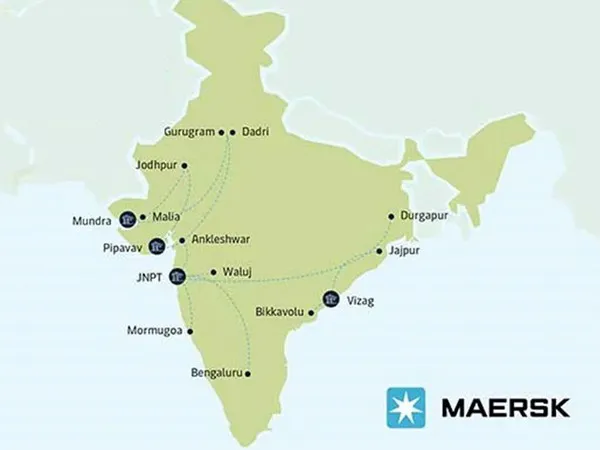Maersk’s 13 new weekly dedicated rail services launched in India in 2021 deliver speed, efficiency, hinterland connectivity, and predictability to customers’ supply chains in the uncertainty of disrupted logistics ecosystem.
The global logistics ecosystem has been disrupted from the beginning of the COVID-19 pandemic. The restrictions brought about by the pandemic affected manufacturing as well as the movement of cargo.
Supply chains came crumbling down with uncertainties for which there was no playbook to refer from. Demand and supply patterns shifted dramatically, further adding to the disruptions in the system.
At such a time, the logistics suppliers kept the wheels spinning for economies to stay on track as much as possible. Maersk had all its vessels sailing, warehouses functioning, and ports operating.

However, it was not smooth sailing as conditions remained foggy with wavering developments around the spread of the pandemic. One particular challenge that Maersk faced during this period in India was moving cargo on landside – from manufacturers facilities to the port for exports or vice versa for imports. Truck drivers had returned to their home towns in fear of the virus, and state border transport became a big hurdle with inconsistent rules being implemented across different states.
At the same time, in line with the goal of creating integrated solutions for customers that go end-to-end, teams within Maersk started focusing on understanding customer requirements and designing tailor-made solutions. Increasingly moving cargo on rail instead of road was one such solution.
Using rail to move cargo had multiple benefits for Maersk’s customers:
- Up to 30% quicker transit times as compared road transport
- Solid, unhindered connectivity between ports and manufacturing hubs
- Scheduled movement for better predictability
- Around 14.5 MT lower carbon footprint
As Maersk started developing customised solutions for customers rather than offering them off-the-shelf options, deeper insights into customers’ needs and challenges started unfolding. Using this data, Maersk developed 13 new weekly dedicated rail services of which some were based on the ‘assured transit’ concept on the Dedicated Freight Corridors (DFC). These rail services were designed in such a way that different industrial verticals were to be connected to the ports.
Examples of these were the ‘Automotive Express’ running between the Northern Capital Region’s (NCR) automotive manufacturing hub and the port of APM Terminals Pipavav, Gujarat or the ‘Retail Express’ that ran on DFC to give assured transit time to lifestyle and apparels sector. The benefits of dedicated solutions like ‘Retail Express’ were multi-fold – customers could reduce their inventory hold by almost 10% and were able to connect to ocean transportation leg in time, saving them penalty costs too.
For more information:
Adhish Alawani
Maersk – West Central Asia
Tel.: +91 7875557435
Email adhish.alawani@maersk.com
